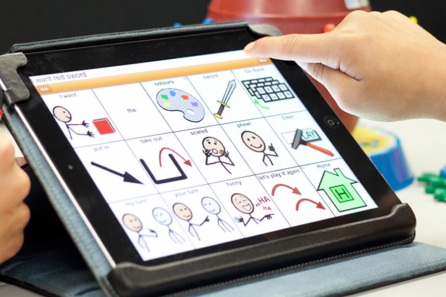-
Read more
The Role of the Speech Pathologist in Aged Care
March 2, 2023
What can cause speech problems in the elderly? As people age, changes in speech, voice, language, memory, and swallowing occur naturally. Communication problems are common in aged care settings with many living with at least one communication disorder. Older people are at higher risk of stroke, or developing dementia, Parkinson’s disease, hearing loss, or voice […]
-
Read more
Speech Therapy with Adolescents
January 3, 2023
What do speech pathologist do when working with adolescents? A speech pathologist can help adolescents with a variety of communication difficulties, including. Pragmatics: This could include working on both verbal and non-verbal communication abilities that support social interaction. Speech: Support with improving articulation and accuracy of speaking sounds. Literacy: Strengthening reading and comprehension skills. Language: […]
-
Read more
Developmental Language Disorder
December 9, 2022
What is Developmental Language Disorder? Developmental Language Disorder (DLD) is a communication disorder that impacts how a child learns, understands, and uses language in their daily lives. DLD is very common, affecting approximately 1 in 14 children, and emerges in early childhood. This condition can be lifelong, affecting an individual’s ability to read, write, speak, […]
-
Read more
Mental Health and Communication Skills
June 10, 2022
There is a strong connection between mental health and communication skills with more and more research into this area in recent years. The link between mental health and communication skills goes both ways; communication skills can be impacted by mental health and communication skills can impact mental health. Speech, language and communication needs (SLCN) can […]
-
Read more
Daily activities to assist our recall abilities
May 16, 2022
Why are our recall abilities so important? Your memory recall ability is a very important skill to have. If you cannot recall important pieces of information, then what is the point of learning this information in the first place? Memory recall is where you recall information that you have previously learnt. Training this skill ensures […]
-
Read more
What is an Allied Health Assistant?
April 10, 2022
An Allied Health Assistant (AHA) is someone who works in allied health settings, assisting Allied Health Professionals. This can include helping directly – providing supervised therapy sessions, or indirectly by creating resources. Allied Health Assistants can work across a variety of different allied health areas, or they might work in one specific area, such as […]
-
Read more
What is a speech pathologist?
March 31, 2022
A speech pathologist is an allied health professional who helps people with communication and swallowing difficulties. Their scope of practice includes assessment and intervention related to disorders of expressive and receptive language, speech, voice, swallowing and fluency. Speech pathologists work with clients to discover their strengths and weaknesses and construct an individualised care plan to […]
-
Read more
How speech pathologists can help with chronic cough
February 12, 2022
Why do we cough? We cough to protect our bodies by clearing the throat, chest and lungs from irritants such as, dust, mucous and phlegm. A cough also protects our bodies when food goes down the wrong way, or during a chest infection. A cough can be reflexive or deliberate A reflexive cough protects our […]
-
Read more
Autism and Play
January 27, 2022
Why is play important for children with Autism? Play is a vital activity for all children. Not only is it fun, but it is also one of the most effective ways to learn new skills. Play helps build skills for thinking, language, problem solving, creativity, and emotional regulation. These are all areas that children with […]
-
Read more
Strategies to assist literacy in everyday community interactions
January 13, 2022
What is literacy? In its most simple form, literacy is a persons combined ability to read and write. We typically think of literacy learning starting once a child enters formal schooling – however, foundational pre-literacy skills begin developing at a much younger age. By 3 or 4 years old, a child enjoys listening to books […]
-
Read more
Living & Communicating With A Person With Aphasia
December 6, 2021
What you need to know about living or communicating with a person with Aphasia You may have heard about aphasia before, or you are only just learning about it because your loved one has been diagnosed with it. Aphasia is a language disorder that occurs when there is some type of damage to the brain; […]
-
Read more
Getting Siblings Involved In Therapy
November 29, 2021
Why get siblings involved in therapy? Siblings can often feel left out or jealous when one child is off going to appointments and has “special activities” they complete at home with their parents. Allowing siblings to join in with home practice and therapy, where appropriate, can help your children feel included and valued. Siblings can […]
-
Read more
Incorporating Speech Therapy In Everyday Routines
November 22, 2021
What are everyday routines and why should I incorporate my speech and language goals? Everyday routines are things you typically do each day. This is as simple as getting dressed in the morning, getting breakfast ready, weeding the garden, playing, or folding the washing. The biggest advantage of including your own or your child’s speech […]
-
Read more
The Importance Of Vocal Hygiene While Working From Home
November 15, 2021
The importance of vocal hygiene when working, learning or participating in Telehealth sessions from home Now more than ever, we are utilising technology to communicate. Thousands of Australian workers are working from home and communicating with their coworkers via video and voice calls. Children, too, are learning from home and connecting with their teachers via […]
-
Read more
Supporting Students With Language Impairment With Home Schooling
November 8, 2021
How to support students who have a language impairment with home schooling Why do kids with language impairment need more support? Children with language impairment can have specific difficulties learning language form (sounds, grammar), content (meanings), and use (intended meaning). These difficulties can impact their ability to understand and/or use spoken/written language. Learning at the […]
-
Read more
Purposeful Play In Promoting Language
October 19, 2021
Why is play important? Play is the key ingredient to children’s learning. It creates moments of learning for children through connection together. Children’s communication is driven by the development of joint attention in which children are able to engage in interactions with others through directed attention to an object of interest or toy. These toys […]
-
Read more
How To Support People With Autism Through Routine Changes
October 15, 2021
Changes in routine can be stressful for both children and adults with Autism. Routines provide a feeling of safety because they are predictable. The level of change that causes distress for individuals with Autism is different for each person. Here, we share some insight into potentially triggering routine changes and provide recommendations on how to […]
-
Read more
How to make the most of your Telehealth speech pathology sessions
October 11, 2021
Your environment has drastically changed again over the past few weeks – and telehealth is now the primary option for speech sessions for the time being. This may bring up several feelings – both good and bad, but let’s go back to basics and set yourself up for success whilst we navigate this together. […]
-
Read more
Can AAC devices hinder natural speech development?
April 15, 2021
So, your child is having trouble communicating and your local speech pathologist has mentioned AAC devices to help make things easier. You might be worried this will stop their natural speech development, but this is a common misconception and a BIG MYTH. AAC devices and systems can be a powerful tool to help your child […]
-
Read more
How to improve social skills in children with autism
March 22, 2021
Social skills are what we use to interact, connect, and communicate with other people. These can be verbal or non-verbal communication skills and help us understand how to behave in social situations and understand the rules (written or implied). Some examples of important social skills for children include sharing, taking turns, cooperating, and communicating in […]
-
Read more
Speech versus language – what’s the difference?
November 5, 2020
If your child has difficulty communicating with others, it is usually due to a delay in speech or language, or sometimes both. So what is the difference? Speech Speech, also called articulation, is how words are pronounced. Children acquire sounds in a particular order. They also present with difficulties with speech sounds that are normal […]
-
Read more
What is speech?
October 6, 2020
Speech is the ability to use and coordinate your lips, tongue and mouth to make sounds. Children learn to use these sounds and how to put them together in words. They develop from the time a child starts using words until the early years at school. Speech Sound Development Speech Pathologists are often asked questions about the […]
-
Read more
What is a stroke?
September 9, 2020
A stroke happens when the blood supply to the brain is interrupted. Blood flow to the brain is essential as it carries oxygen and nutrients to keep the brain working. If blood flow stops to an area of the brain the cells begin to die. A stroke may be caused by a blockage (ischaemic stroke) […]
-
Read more
What is diaphragmatic breathing?
August 4, 2020
Most people already breathe this way when they are relaxed. However, a lot of people take shallow breaths that do not engage the diaphragm very much. Diaphragmatic breathing uses the muscle called the diaphragm, which sits at the base of the lungs. When the body inhales, the diaphragm contracts and moves down. As the breath […]
-
Read more
What is NDIS funding?
May 14, 2020
The National Disability Insurance Scheme provides funding and support for people living with a disability. Each eligible person will receive an individualised funding plan based on their functional needs and goals they wish to achieve. What is the difference between NDIS and NDIA? The NDIS is a national system that provides support to those living […]
-
Read more
What is Dysphagia?
April 27, 2020
Dysphagia is discomfort or difficulty in chewing or swallowing. Anyone can have a swallowing problem at any stage of life. What difficulties are associated with Dysphagia? There are a number of difficulties associated with Dysphagia and can include anything such as: Difficulty sucking Difficulty drinking Difficulty chewing Difficulty swallowing Difficulty controlling saliva Food/liquids spilling from […]
-
Read more
What is Aphasia?
April 16, 2020
Aphasia is a communication impairment that can result in difficulties speaking, understanding what someone is saying and difficulties with reading and writing. Aphasia usually occurs following brain damage but can also occur from things such as, degenerative diseases and brain tumors. The severity of aphasia will depend on the size and location of the brain […]
-
Read more
How can my communication effect job performance and job seeking?
March 18, 2020
In most jobs, communication is used constantly throughout the day. This may include greeting a customer, sending an email, answering the phone, speaking with management, providing and understanding instructions for a task, or writing a report. Successful communication generates idea sharing, increased productivity and straightforward conflict resolution. Miscommunication in the workplace frequently causes business shortfalls […]
-
Read more
What is a tongue-tie?
February 19, 2020
A tongue-tie, also known as ankyloglossia, is when the tongue is anchored to the bottom of the mouth restricting movement. This may mean the tip of the tongue cannot poke out past a person’s lips or when their mouth is open they may have difficulty touching the roof of their mouth. Sometimes, when a person […]
-
Read more
The Human Voice
January 15, 2020
The human voice is unique to everyone. Your voice can help express your personality, emotions and even your physical health. Your voice is created by the vocal cords in your voice box (larynx). Our vocal cords open and close as we inhale and exhale to let air in and out of our lungs. Our vocal […]
-
Read more
How Can Autism effect Communication?
November 14, 2019
Autism is a neurobehavioral condition that causes impairments in the areas of communication, social skills, and may cause restricted and repetitive behaviours. It ultimately effects how the person is able to interact with the world around them. The level of impairment and specific challenges varies widely between people. Some people may have difficulty using verbal […]
-
Read more
5 Ways To Improve Speech Skills
November 8, 2019
Difficulties articulating speech sounds can impact a person’s confidence expressing themselves and can also impact on their ability to be understood by others. There are a number of ways to help improve and develop speech sound skills for both children and adults. Practice in front of a mirror or using video. One way to help […]
-
Read more
Do speech therapists treat adults?
October 9, 2019
Speech therapy treats a range of disorders, delays and difficulties across the lifespan. While it is often thought of in the community as a service for children, speech pathologists are trained in communication and swallowing disorders for all ages. Their role is diagnosis, treatment and management. What may an adult need speech therapy for? Speech […]
-
Read more
What is a social communication difficulty?
September 8, 2019
The basic purpose of communication is to interact with others and therefore it is no surprise that we are constantly using social skills. Some children and adults have difficulty developing social skills in a typical way and this can cause varying challenges when interacting with others. The individual may be aware or unaware of their […]
-
Read more
What’s involved in treating a stutter?
August 8, 2019
Stuttering is a speech fluency disorder where the flow of speech is interrupted. It can impact both adults and children and can be treated at all ages. Treatment for stuttering requires specialist input from a speech pathologist who is trained in a variety of stuttering therapies. The specific therapy used will depend on the individual, […]
-
Read more
What is feeding therapy?
July 4, 2019
Feeding therapy is a specialised form of therapy that helps children with feeding difficulties to learn how to eat or can help them to eat better. Children may have difficulties with chewing, drinking, expanding the range of foods they eat, or swallowing foods. Mealtime Routines Creating routines around mealtimes can help your child to learn […]
-
Read more
3 Children’s Speech Therapy Exercises You Can Do In The Car
June 5, 2019
Sometimes it is hard to find time to do homework while working around other commitments with your kids. In the car is a perfect time for busy families. We spend a lot of time in the car and it is a great opportunity to use that time to work on their speech and language while […]
-
Read more
What do I do if my toddler has a speech and language delay?
May 9, 2019
If your child has a speech or language delay, contact a Speech Pathologist as soon as you can. It is important to begin intervention as soon as possible to gain better results from therapy and allow children to fully participate in daily interactions and experiences. What is a speech and language delay? Children acquire sounds […]
-
Read more
Top three augmentative communication systems for autism
April 10, 2019
There are many augmentative communication systems that can be used with individuals who have been diagnosed with autism. These systems can range from ‘high-tech’ systems such as a speech generating device, a ‘low-tech’ system such as a communication book or a ‘no-tech’ system such as using Australian Sign Language. Below are the three augmentative communication […]
-
Read more
What’s the best assistive technology for communication in 2019?
March 6, 2019
Assistive technology is a valuable tool that can be used with children and adults who have little or no means of verbally communicating. Assistive technology provides the individual with an alternate means to communicate their wants, needs, thoughts and ideas, as well as participate in daily activities with independence. The best assistive technology for communication […]
-
Read more
What is augmentative and alternative communication?
January 17, 2019
Augmentative and Alternative Communication (AAC) includes any method of communication that is used to enhance or replace verbal speech. There are two different types of AAC – aided and unaided systems. Unaided AAC is where you don’t use anything else but your body. These include: Sign language Gestures Facial expressions Body language Aided AAC is […]
-
Read more
Speech therapy games to make learning fun at home
December 17, 2018
For speech therapy to be most effective, practice outside of therapy sessions is very important. No matter what goals you and your child are working towards, practicing each day will allow your child to make progress towards achieving these goals. Completing speech therapy at home allows your child to practice the skills they are learning […]
-
Read more
What Do I Do If I Have a Fussy Eater?
November 17, 2018
How to recognise and help a fussy eater Having a fussy eater can be a daunting and frustrating experience – we’ll explain what to do and how we can help you. What is fussy eating? There are a number of factors that define a child as being a fussy eater. The range of foods that […]
-
Read more
What Is A Speech Assessment?
October 17, 2018
What are speech assessments and how we use them to help you Speech Pathology assessments are a combination of formal and informal assessments. They are specifically tailored to the client and their areas of concern. They assist your clinician to determine areas of strength and weakness to deliver individualized goal setting and therapy. What kind […]
-
Read more
Stuttering – what parents need to know
July 13, 2018
Stuttering – what parents need to know Stuttering impacts upon approximately 1% of the population whether it be children, adolescents or adults. This affliction usually starts in early childhood before the commencement of school and may have either a gradual or sudden onset to the symptoms seen or experienced. What causes stuttering? No one knows […]
-
Read more
Strategies For Assisting Individuals with Autism Spectrum Disorder
May 8, 2018
In this blog, we will explore the most common difficulties experienced by individuals with autism spectrum disorder and some of the strategies that can be of assistance across home, education and community settings. How to help with difficulties with language Individuals with autism spectrum disorder may experience a range of difficulties expressing their needs, wants […]
-
Read more
Red Flags of Autism – Learn the Symptoms
April 23, 2018
Red Flags for Autism Spectrum Disorder (ASD) Autism Spectrum Disorder (ASD) is a lifelong condition that affects 1 in 88 children. It impacts upon the way an individual interacts and communicates within their home, school and community environments. Early intervention provides the best outcomes for children diagnosed with Autism Spectrum Disorder. The earlier a carer […]
-
Read more
How Do I Know if My Child Needs Speech Therapy?
March 8, 2018
When it comes to communication development, there are general communication milestones which determine if a child is progressing appropriately with their speech and understanding abilities. These communication milestones tell us whether their current skills are typical for their age.

















































